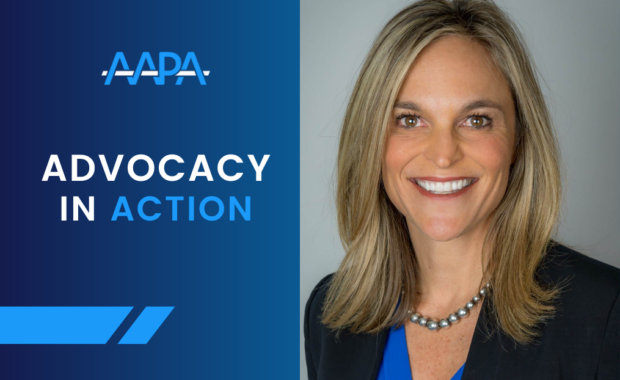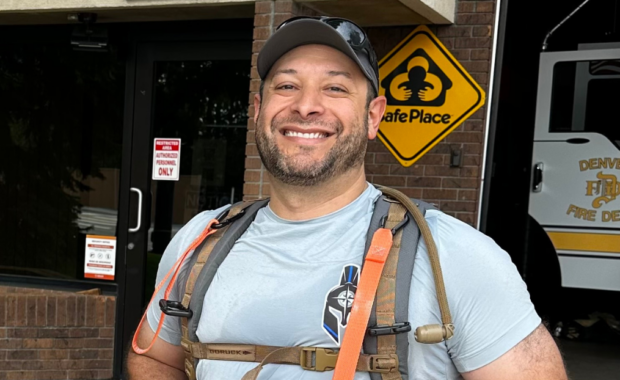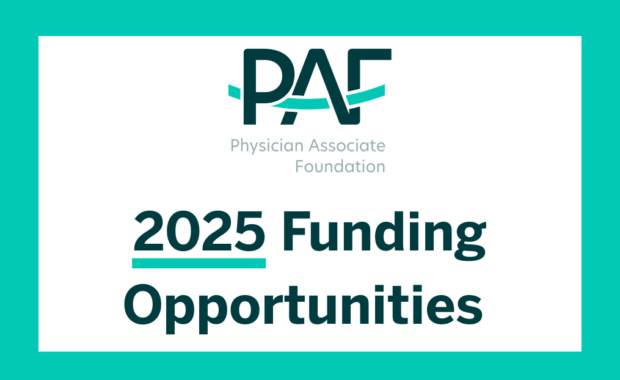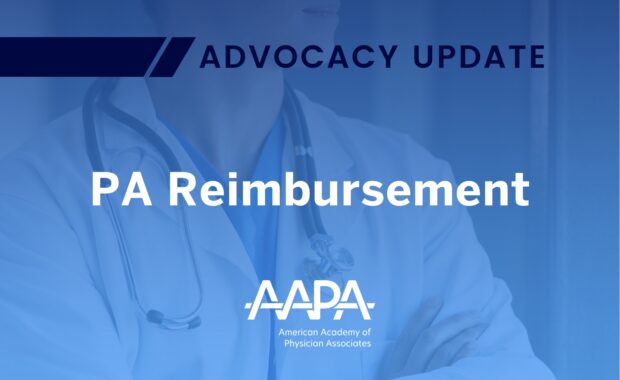Four Experts Offer Career Advice During Pandemic
Challenges and Opportunities Outlined in Huddle “Ask Me” Session
January 1, 2021
COVID-19 has affected every person in some way. Whether you’re working from home, donning head-to-toe PPE, wearing masks at the grocery store, or celebrating your birthday on Zoom, the world looks different now than it did six months ago. For PAs who are on the front lines of the COVID-19 response, their worlds look different too. Some PAs have been redeployed. Some have been furloughed or laid off. New graduates are looking to join the work force during a time of unprecedented upheaval. Telemedicine visits have skyrocketed. Through it all, PAs remain committed to their patients.
In July, AAPA hosted a Huddle “Ask Me” session that featured four experts advising PAs on various career scenarios – scenarios many other PAs may experience. Read their advice for PAs facing different challenges and opportunities in the midst of a pandemic. Their feedback may resonate with you.
 The Experts
The Experts
Jennifer Anne Hohman has been a PA career advocate since 1999, helping PAs to negotiate better employment contracts, redirect their careers in more rewarding directions, and to be confident professional self-advocates. After serving with AAPA’s Professional Affairs team for over a decade, since 2014 Jennifer’s company PA Career Coach has provided PAs with individualized coaching for professional growth.
Folusho Ogunfiditimi, DM, MPH, PA-C, DFAAPA, has more than 21 years of experience as a healthcare administrator and practicing PA. He currently serves as the administrator of Practice Management for Florida Health Care Plans (FHCP) and holds an MPH and PhD in organizational leadership. He currently serves as the chair of the FHCP COVID-19 Taskforce, which developed all COVID-19 related operational, executive, and technological policies and procedures for FHCP.
Melinda Gottschalk, MPAS, PA-C, DFAAPA, has been a practicing PA for 28 years and has extensive experience in telemedicine. She helped bring telemedicine into her neurology department at Baylor, Scott & White Health at the end of 2018 and telemedicine quickly became about 20% of her practice. During the COVID-19 crisis, she created a telemedicine team, as well as resources for the different platforms and types of telemedicine.
Andrea Lowe, MHA, PA-C, director of AAPA Employer Strategy, practiced emergency medicine for almost 19 years and has been at AAPA since 2019. She received her MHA in 2007, served as a chief PA, then Director of APPs, and then served as Vice President of Operations at TeamHealth. In that role, she responsible for financials, budgeting and operations for physicians, scribes, PAs and NPs, and built sustainable relationships with C-Suite members of hospitals.
The Advice
Consider Volunteer Opportunities
Gottschalk: I would try to find volunteer opportunities. Volunteering can turn into a job opportunity, looks great on your resume, and helps you start making professional contacts. It could even give you more insight on where and how you want to work as a PA.
Ogunfiditimi: Specialties like orthopaedics have been particularly impacted by COVID-19. One way for PAs who have been furloughed to keep busy might be to volunteer at your local public health department. In Florida, they are taking volunteer PAs like crazy right now. With the spike in numbers, the health departments are scrounging for medical personnel to serve as contact tracers and epidemiologists. If you have even a remote interest in public health, go down to your state or county health department. They will keep you engaged with some very interesting disease-exploring work.
Target Emergency Med or Urgent Care Opportunities
Ogunfiditimi: I suggest targeting areas of high PA demand right now, which will include emergency medicine/urgent care and infectious disease and public health. We don’t have many PAs in infectious disease or epidemiology, but this could be an emerging specialty area. If you have that interest, highlight your experience and/or clinical rotations in infectious disease. Another area to investigate is critical care. PA value in critical care medicine has increased dramatically. Highlight your clinical rotations that demonstrate your willingness to be part of critical care teams. It is a very interesting time to be a provider and the silver lining may be that we grow as a profession in areas where we have traditionally not had a significant presence.
[Login to Huddle to see 11 New Grad Tips from the PA Career Coach]
Develop New Skills or Redeploy Existing Skills
Ogunfiditimi: If you’ve been reassigned, use this time as an opportunity to learn a new skill set and look to apply those newly-learned skills when you go back to your original place of work. For example, a critical care PA reassigned to the emergency department can develop new skills around patient triage, rapid assessments, rapid diagnosis, and patient management, all skills that are easily transferable back to the ICU. A PA in surgery redeployed to a COVID unit can enhance their abilities in team dynamics, patient communication, and continuum of care that can be useful when managing post-op patients. The key for reassigned PAs is to keep an open mind and be prepared to use their learned skills in any future position they find themselves.
Hohman: Many PAs have traveled very interesting career paths, and I’d suggest as a first step that you reflect on the connecting strands in your past experience that lead you now to your next specialty. What unique experiences and insights did you gain in previous roles that would inform your practice in this new field? What do you love the specialty and what makes you inspired to practice in it? Next, polish your CV/resume and cover letters to help readers understand both your clinical preparation and the unique personal journey you’ve taken thus far and the insights it’s provided that prepare you to be an amazing and compassionate provider in this field. Knowing your “story” and unique skills helps to make it compelling to a potential employer. I would also suggest networking as much as possible, including through AAPA special interest groups and through LinkedIn, where you can connect with others working in particular fields. Volunteering would also help build up a network of potential employment contacts and deepen your direct experience in any specialty.
Sharpen Your Remote Skills
Hohman: Practice doing a mock interview (or two!) with a PA friend. Test your audio/video/internet connection using the same software as the interview. Ask for feedback on your body language, demeanor, how your physical environment looks in the frame as well as on your answers to anticipated questions. On the day of the interview, dress as if attending an in-person meeting, and be sure your environment looks neat–a notepad, glass of water, and your CV are great to have alongside, not much else! Make the call in a quiet area with good internet connectivity. Using headphones on the call can help with audio feedback. As with any interview, knowing your talents and relevant skills and preparing well-researched questions about the employer leads to a more confident, engaged, two-way conversation.
Gottschalk: Your company should have a solid telemedicine presence before the next wave hits. Right now, insurances are paying the same as in-person visits. No reason to not see whomever you can via telemedicine. The patients will appreciate it, and they will go elsewhere to find telemedicine if they do not feel safe in your office. By using telemedicine, we were able to continue to see patients and can switch to telemedicine easily if the need arises in the coming months.
[PAs in Virtual Medicine and Telemedicine]
Make inroads with C-suite executives
Lowe: This is a great time to look at your relationship currency. Leverage the current relationships you have with leaders you have worked with in the past. Reach out to PA and physician leaders you already know and do some exploratory work on the stakeholders in those organizations. Most of the time that I initiated contact to a C-suite exec it was through the efforts I have mentioned above. C-suite members want to see that you know the content you are presenting to them. It is important that you are speaking to concepts and initiatives that are relevant to their organization. However, it is important to curate information that will resonate with them. Ways to increase revenue and lower costs in any healthcare sector will always resonate. For each organization you want to connect with, find out about their specific gaps in current processes in this area. I would include that in your presentation or initial conversation. My experience is that C-suite execs like to hear that you know about their organization and initiatives. You have knowledge of the service and the clinical background. That is your foundation for success.
Look for administrative roles
Lowe: One of the key factors I looked for when I wanted to transition into a leadership role was finding organizations that created opportunities for leadership. Looking for an organization that has a PA leadership structure or is supportive of promoting PAs into administrative roles is key or else it will be very hard for you to move further along in your leadership career. Volunteer on committees that provide opportunities for you to interact with key leaders. Also, look for a mentor or sponsor in administration. Lastly, utilize platforms such as Huddle’s Mentor Match and PA Administrators, Managers, and Supervisors group to network with PAs already in leadership. It also helps to join organizations such as ACHE and other healthcare membership organizations to broaden your network. This provides you with the opportunity to form relationships in a larger arena as well.
Ogunfiditimi: Don’t be too overwhelmed by the idea of getting into administration! The first thing you should do is ask/seek to join a committee or two that may be of interest to you at your institution. If you volunteer on a committee, you are bound to get an assignment and based on the work you do on the committee assignment, you likely will get noticed and more assignments will ensue. Before you know it, you become the subject matter expert on that particular area and that’s how you get noticed. You’re looking to gain clinical administrative experience and in most cases that can be as simple as raising your hand and volunteering.
Editor’s note: This article originally appeared in August 2020.
You May Also Like
Huddle “Ask Me” Sessions
Resources for Furloughed, Underemployed and Unemployed PAs
8 Networking Tips for PAs
Thank you for reading AAPA’s News Central
You have 2 articles left this month. Create a free account to read more stories, or become a member for more access to exclusive benefits! Already have an account? Log in.



